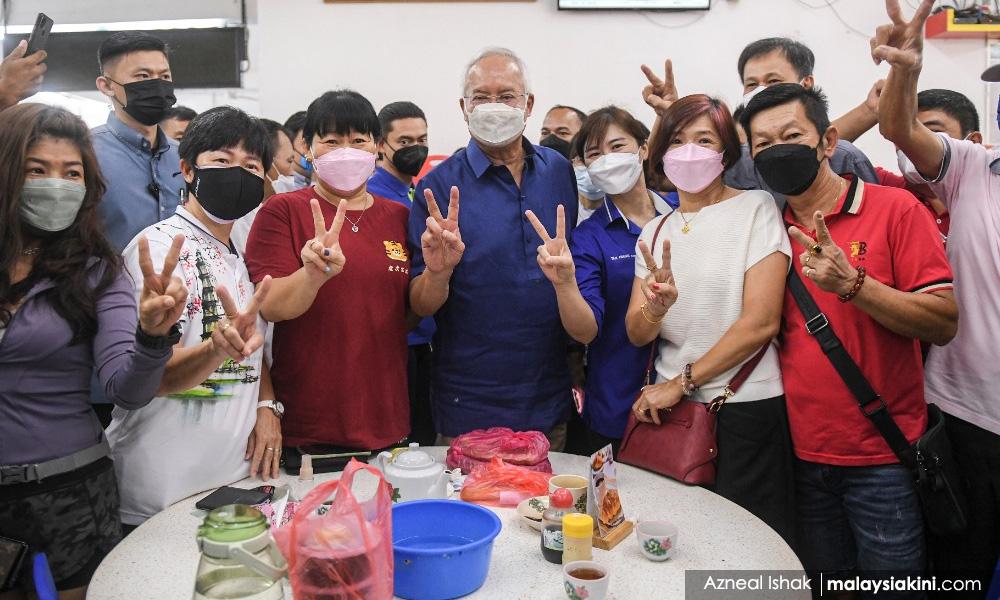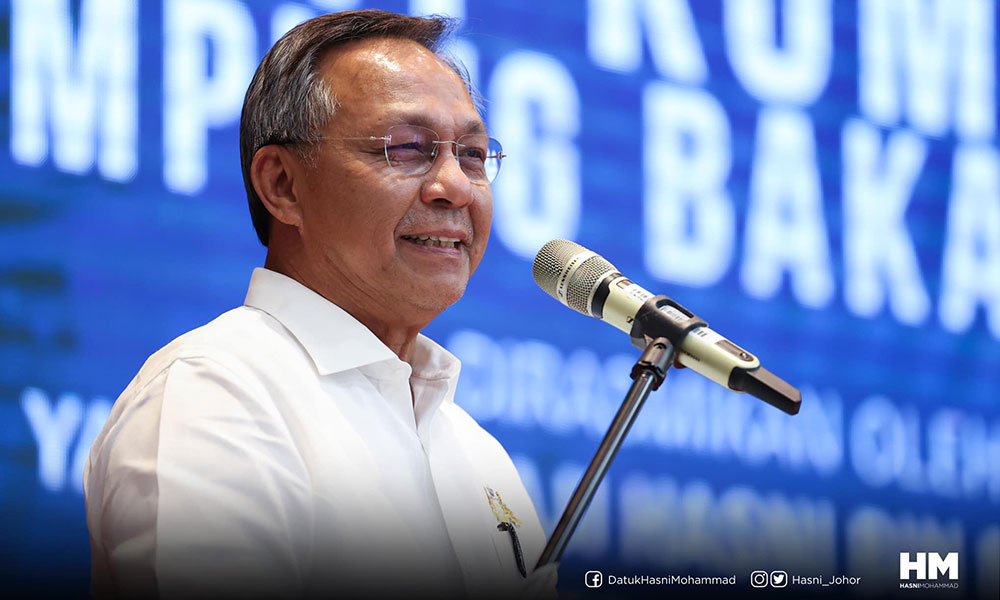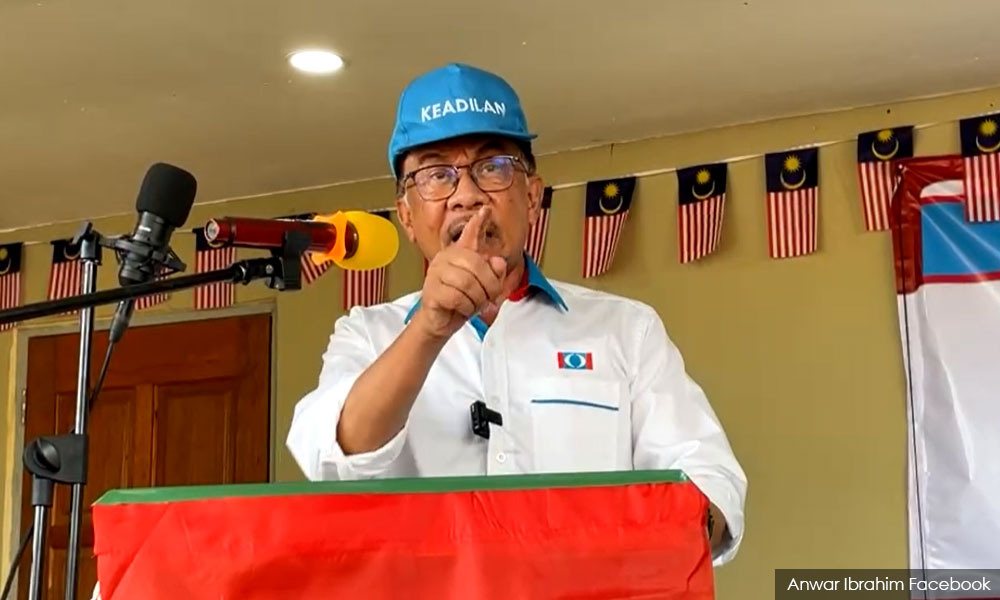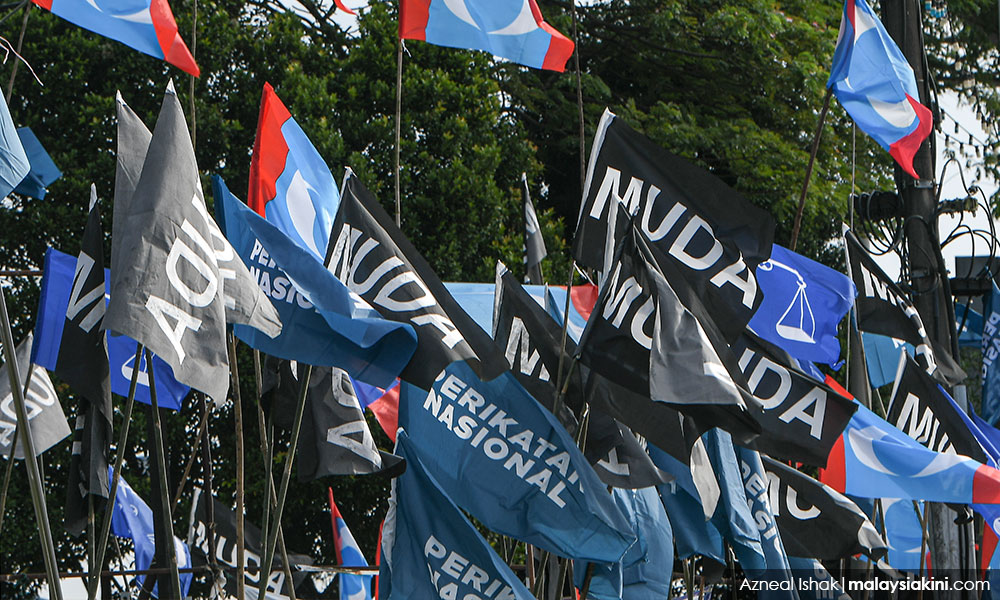With only two days left in the Johor campaign, the mood is getting (a bit) warmer. There is more buzz in the coffee shops with the occasional shout, more frenzied movement on the ground by campaigners (some bringing goodies), phones are blasted with messages from mysterious numbers and a rising expectation of a reckoning.
Reluctant and undecided voters are starting to look at what is on offer, with some still never having heard of a few of the parties contesting in this Saturday’s state election.
Despite the pressing need to address the challenges facing Johor, including greater assistance for vulnerable voters, economic recovery and recalibration of the state’s economic model, the focus of the campaign remains on the past. All of the parties are being haunted by their ghosts – some of them still alive and kicking.
Boss is back
The dominant issue of the Johor campaign has been convicted criminal former prime minister Najib Razak. He has been the most talked-about campaigner. He knows that with every vote he can deliver, it will increase the chances that he can get away with his crimes.
Not surprising, both Perikatan Nasional (PN) and Pakatan Harapan/PKR are arguing that a vote for Umno is a vote to empower the former prime minister. A ‘big-win’ for Umno is seen to lead to an early national election, one in which, it is argued, Najib will be let off for his crimes.
Najib knocking on the door in Johor is having different effects. Spooked, some traditional Harapan voters are now considering voting, recognising that if they stay home, they are empowering him and his ‘court cluster’ allies.

This Najib-centred message is also strengthening PN. Najib’s is cutting into Umno’s base, especially among younger voters, who are now associating Umno in Johor with Najib rather than with the popular Menteri Besar Hasni Mohammad. The message of moving on to a different future resonates with those who associate the stain on Umno with Najib.
For the Umno/BN long-time loyalists, however, Najib is bringing them back to the roost, reinforced by old ‘cash is king’ practices.
This is the rub for Umno in Johor: it is still dependent on the party’s romanticism of the past. Despite having many capable leaders in Johor, they are being overshadowed by the tainted ones. Rather than centre the Johor campaign around Hasni, as was initially promoted at the start of the campaign, national leaders have opted to centre the Umno campaign around themselves – again.
Umno’s persistent divisions
What makes this worse for some Umno members is that Najib’s court sidekick Umno president Ahmad Zahid Hamidi has played a larger role in this campaign than he did in Malacca in the candidate selection and appointment of his allies. On the ground, there is some disgruntlement with candidate choices. What is surprising is that these factional divisions are still not settled in some seats.
The national divide in Umno is ever-present. Hasni is seen to be associated with the Tok Mat (Mohamad Hassan)-Khaled Nordin faction in the party, calling for alternative non-Najib/Zahid led leadership of Umno and more reforms. The response has been to fuel speculation that Hasni could even be replaced by the gluttony of Zahid’s loyalists if two-thirds is secured.

Umno Johor has always faced internal battles, as the competition within Umno has been intense. This campaign, the party’s national internal tensions simmer, with the persistent problem of who should lead the party still relevant.
Umno has not been able to address the problems that caused it to be kicked out of power in GE14. A big victory for Umno in the party will mean returning to the past, an unwillingness to engage in reforms. Hasni’s sensible leadership style – working with the opposition to resolve issues – and willingness to engage in substantive reforms to address malapportionment and fair distribution to constituency allocations across parties has not endeared him to some within Umno’s ranks.
Ghost of Harapan past
Harapan/PKR is dealing with its own ghosts – nominally its record in office but realistically the aftereffects of raising expectations unrealistically and getting caught up in its own internal power struggle. Umno/BN’s attack has concentrated on attacking Harapan’s record in government, with 22-months this and 22-months that.
Harapan/PKR has taken the bait, responding defensively and reinforcing the mindset that their record in office was less than its promises. The attacks on Harapan/PKR as ‘liars’ and ‘failures’ are relentless and feed into the varied disappointments of voters after the high expectation around May 2018. Rather than look at the difficulties of the immediate past 24 months of the current now Umno-led government, the focus is on events two years ago.

Harapan/PKR has not been helped by the reality that Hasni has outperformed the underwhelming Bersatu chief ministers - then part of the Harapan coalition - Osman Sapian from May 2018 to April 2019 and Sahruddin Jamal from May 2019 to February 2020.
Harapan/PKR is getting a comparatively cold reception this campaign. Part of this is the coalition’s leadership has been so self-absorbed on its own internal politicking. It has lost touch with the ground, and, even more challenging, struggles with how to engage its less enthusiastic, even sometimes angry, supporters. The ground has been cold for some time.
Johor polls, more than those in Malacca, is a wake-up call to the chill within Harapan’s base – so much so that even some of the Harapan candidates are getting goosebumps.
Equally important, for many Johoreans the old mantra of ‘Save Malaysia’ has been replaced by a reality of needing to save themselves. There is anger at all politicians who have been seen to be focused on themselves rather than the welfare of the electorate.
Giving up the ghost
For all the parties, this Covid-related campaign poses real challenges. The SOP impact is well-known, as it undermines the capacity to create a mood during ceramah. Yet the meetings that are being held are poorly attended. Parties are essentially speaking in hollow echo chambers, echoing messages of the past. This is being enhanced by parties relying on social media, where echo chambers are more evident.

As the campaign reaches the end, it is almost like some of the parties are giving up the ghost, knowing that they cannot deliver results successfully. This is the reality of weakness of all the parties, but the difficulties are more pronounced in Harapan/PKR and the new entrants.
Importantly, a state-based campaign is not what parties are used to. The campaigns continue to focus on national issues in what is a state contest. Many of the campaigners and candidates do not even know what the issues are on the ground for Johoreans.
Even more telling is the lack of willingness to engage with these issues. All of the parties avoided using the word ‘manifesto’ in laying out their platforms, afraid that promises and a lack of delivery on promises will haunt them.
The campaign has largely ignored the important issues associated with state governance, not least of which is how Johor should strengthen inclusive development. There has been little debate on the removal of the Johor health card by Umno or the reinstatement of Umno patronage programmes locally, for example. There is still considerable resistance to engage meaningful policy discussions.
Instead, the campaign’s substance is empty – not unlike the many haunted vacant unsold properties developers are trying to sell in southern Johor.
In these last two days, there will likely be a few quiet night visits of cash deliveries. Like the 2020 reports of mysterious late-night door knocking in Kampung Melayu Majidee, where the funds came from will remain a mystery. Campaigns go through the motions as they do in the past. Political parties and candidates across the spectrum appear lost, even soulless. Instead, ghosts roam. - Mkini
BRIDGET WELSH is a senior research associate at the Hu Fu Centre for East Asia Democratic Studies and a senior associate fellow of The Habibie Centre. She currently is an honorary research associate of the University of Nottingham, Malaysia's Asia Research Institute (Unari) based in Kuala Lumpur. She tweets at @dririshsea.
The views expressed here are those of the author/contributor and do not necessarily represent the views of MMKtT.




No comments:
Post a Comment
Note: Only a member of this blog may post a comment.